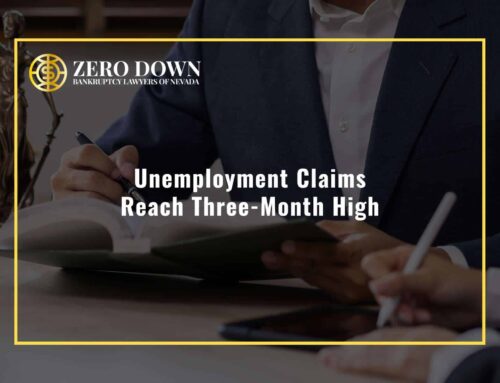Some Phoenix locals prefer Spinato’s pizza for their sauce, or Doughbird for pizza for their rotisserie chicken. But Streets of New York is one of the oldest and largest pizza chains in Arizona. Started in 1976, it has spread across the state and even to one location in Las Vegas, Nevada. In addition to pizza, they serve sandwiches, pasta, passion bread garlic knots, and other Italian-inspired dishes. Despite longstanding success throughout the Valley, Streets of New York has apparently hit a bump in the road. The pizza chain filed for Chapter 11 bankruptcy in the District of Arizona on October 16, 2025.
A bankruptcy filing- especially a Chapter 11 bankruptcy filing- doesn’t necessarily mean the debtor is going out of business. Businesses can file for Chapter 11 bankruptcy to restructure their debts and stay open, while a Chapter 7 bankruptcy filing typically requires a total shutdown. In Chapter 11 bankruptcy, the debtor works with a committee of their top creditors to formulate a plan to settle debts and emerge from bankruptcy. But appointing and gathering this committee makes the process longer and more expensive. Streets of New York utilized a Subchapter V filing, which removes the creditor committee requirement for small businesses.
When a restaurant that has been declared the official pizza of the Arizona Diamondbacks and Phoenix Suns declares bankruptcy, it’s a sign of a generally vulnerable economy. You may also be struggling with paying off debts, juggling interest and late fees, avoiding creditors, and more. Put a stop to the cycle by filing for bankruptcy with our experienced law team. Schedule your free consultation today at 602-609-7000.
![]()
What Is a Deficiency Notice?
There was a deficiency notice, also known as a deficiency memo, issued for Streets of New York’s Chapter 11 bankruptcy case on October 17, 2025. This deficiency is an official notice to inform the debtor that there were required documents missing from their petition filing. Typically, a case administrator will attempt to resolve the issue through a courtesy call before a deficiency notice is issued. But a courtesy call is only made to the debtor- a deficiency notice lets all parties involved in the case know about the issue. The court has an interest in resolving matters in a timely manner, so failure to comply with a deficiency notice can lead to a case being dismissed, as demonstrated here by Streets of New York.
Bankruptcy courts encourage debtors to regularly check their mail, voicemail, and email during an active bankruptcy case, in part because of the tight deadlines that must be followed if a deficiency notice is issued. A case can be dismissed if certain documents aren’t filed the same day as the petition is filed, while other documents must be filed within 72 hours or 14 days of the petition being filed. If the debtor can’t provide the documents within the deadline, they should file a motion requesting an extension on the deadline. Granting the motion will be decided based on the judge’s discretion. Based on the specific circumstances causing the deficiency notice, the debtor may be required to file additional forms along with their supporting documentation. A Summary of Amended Schedules lets the court know which documents have been added to the previously-filed petition. The debtor may have to pay an additional filing fee to respond to a deficiency notice.
Staying on top of court communications during a bankruptcy case can be overwhelming on top of your already-busy lifestyle. Deficiency notices can have tight deadlines, so forgetting to check your inbox for just a few days could have devastating effects on your case. Hiring a reputable bankruptcy firm to manage your case takes this burden off your shoulders and gives you more time to focus on your post-bankruptcy outlook. If you’d like to discuss your case with an experienced Arizona bankruptcy lawyer offering Zero Down post-filing payment options, call 602-609-7000 today.
Re-Filing a Dismissed Bankruptcy Case
When a bankruptcy case is dismissed, it is either done with or without prejudice. Streets of New York’s Chapter 11 bankruptcy case was dismissed without prejudice. This indicates that Streets of New York has an opportunity to re-file its case with all of the documentation as listed in the deficiency notice. Unfortunately, until the case is re-filed, Streets of New York will no longer be protected by the Automatic Stay. The Automatic Stay goes into effect when a debtor files their bankruptcy petition and protects them from debt collection efforts. This protection ends when the case is discharged or dismissed. That means Streets of New York’s creditors can theoretically file lawsuits, repossess assets, and engage in other collection actions until the bankruptcy petition is re-filed.
While honest mistakes happen, bankruptcy courts want to encourage debtors to be as accurate with their filings as possible. When a debtor files bankruptcy multiple times, it can affect their protections from the automatic stay. Per 11 U.S.C. 362(c)(3), the automatic stay can be reduced for a Chapter 7, Chapter 13, or Chapter 11 bankruptcy debtor who files a second bankruptcy petition after a previous case was dismissed within the past 12 months (with some exceptions for Chapter 7 bankruptcy debtors) will be subject to termination of the Automatic Stay 30 days after filing their petition. The court can extend that 30-day Automatic Stay if the debtor can prove that the second bankruptcy filing was made in good faith. Some of the reasons the court may find that a second bankruptcy filing was in bad faith include:
- If the debtor had more than one pending Chapter 7, Chapter 11, or Chapter 13 bankruptcy case in the preceding year
- The debtor failed to amend their petition or file required documents within the past year without a substantial excuse
- The debtor failed to perform terms of a plan ordered by the court within the past year
- There hasn’t been a substantial change in circumstances since the debtor’s last case that leads the court to believe a Chapter 7 case will end in discharge or a Chapter 11 or Chapter 13 case will end with a confirmed plan that can be fully performed
Arizona’s Choice For a Seamless Bankruptcy & Affordable Payment Plan Options
Streets of New York has been an Arizona staple for nearly 50 years, but it has now made an example of itself of what can go wrong with an inaccurate bankruptcy filing. After failing to respond to a deficiency notice, the court was forced to dismiss Streets of New York’s case, leaving the pizza chain without protection from the Automatic Stay. The restaurant could be subject to a shortened Automatic Stay if they do re-file the case. All of this comes with extra costs and delays that could have been avoided with a more carefully-prepared bankruptcy petition. An individual filing for Chapter 7 or Chapter 13 bankruptcy can face similar consequences to a business that incorrectly files a Chapter 11 bankruptcy petition. Don’t fall victim to the assumption that you can’t afford to hire a high-quality Arizona bankruptcy lawyer to handle your case. Our skilled bankruptcy team makes clearing debts as simple as possible, all at an affordable price. See if you qualify for our Zero Down, Zero Interest post-filing payment plan option. Schedule your free consultation with Arizona Zero Down Bankruptcy Lawyers today at 602-609-7000 to learn more.
Arizona Offices
Phoenix Location:
343 W Roosevelt Street, Suite #100
Phoenix, AZ 85003
Email: [email protected]
Phone: 602-609-7000
Mesa Location:
1731 West Baseline Rd., Suite 101
Mesa, AZ 85202
Email: [email protected]
Glendale Location:
20325 N 51st Avenue, Suite #134
Glendale, AZ 85308
Email: [email protected]
Tucson Location:
2 East Congress, Suite #900
Tucson, AZ 85701
Email: [email protected]










